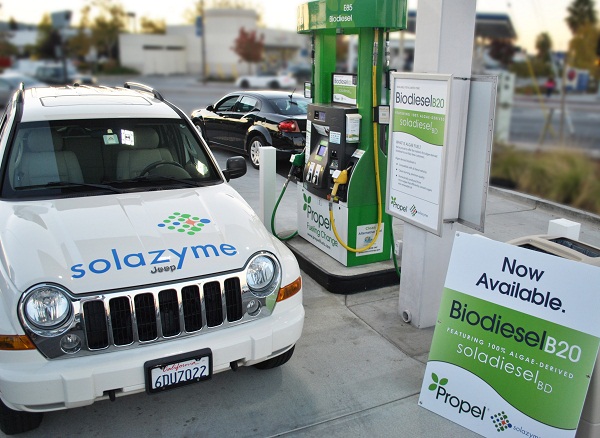The nascent algae-derived biofuels industry has had some successes in recent years, powering commercial airliners and a range of military vessels, from a Marine landing craft to a Navy destroyer, in test runs.
But except for a random stunt or two, algae fuel hasn’t received much sustained attention for everyday consumer retail use – you know, at the corner gas station. But that’s changing in the Bay Area, at least for a month: Propel Fuels on Tuesday said four of its stations began “bringing algae-derived fuel to retail pumps for what we believe to be the first time in history.”

Propel’s partner on the program is a familiar name – Solazyme, the South San Francisco company that has been at the center of the military’s forays into algal biofuel.
Propel said that for the next month its stations in Redwood City, San Jose, Berkeley and Oakland would sell algae-based SoladieselBD, which is compatible with existing diesel engines, at the same price as conventional diesel fuels.
Solazyme ferments plant sugars into oils using microalgae. The company cites testing by the National Renewable Energy Laboratory that shows that the blend Propel is selling – 20 percent algae biodiesel and 80 percent petroleum diesel – “significantly outperforms ultra-low sulfur diesel in total hydrocarbons, carbon monoxide and particulate matter tailpipe emissions. This includes an approximate 30 percent reduction in particulates, a 20 percent reduction in CO and an approximate 10% reduction in THC.”
Propel has more than two dozen West Coast locations, in Northern California, the Puget Sound region and Southern California. It sells biodiesel made from waste vegetable or soybean oils, as well as E85, a blend of 85 percent ethanol and 15 gasoline for Flex Fuel vehicles.
A company spokesman told EarthTechling Propel was ready to make SoladieselBD a regular part of its offerings (along with other advanced biofuels) just as soon as the stuff is produced in the necessary volumes.
While that day awaits, Solazyme said the Propel program represents another step forward in demonstrating that its products have a wide role in the green transportation fuel future.
“We’ve successfully demonstrated our land-based fuels in fleet vehicles and corporate buses, and are excited about this pilot program with Propel because it enables us to make these fuels available to the public,” Bob Ames, VP of fuels for the company, said in a statement.
Serious questions remain, however, as to the actual benefits of turning to algal biofuels on a large scale, at least at this point in the industry’s evolution. A recent, comprehensive report from the National Research Council was skeptical of the sustainability of algal biofuels if scaled up to meet 5 percent of the nation’s transportation fuel needs, and a 2011 University of Virginia study found that while algae was capable of producing high energy output, there were serious environmental concerns that accompanied its production. Beyond the sustainability question, a 2010 report from the Energy Bioscience Institute at UC Berkeley said the high costs of producing the fuels meant that the industry was at least 10 years away from viability.